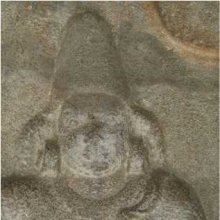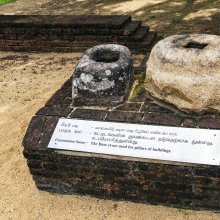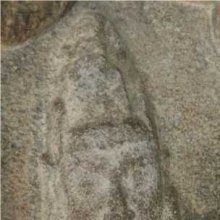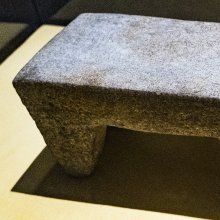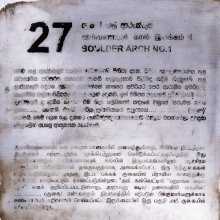Kal: 14 definitions
Introduction:
Kal means something in Hinduism, Sanskrit, Hindi, biology, Tamil. If you want to know the exact meaning, history, etymology or English translation of this term then check out the descriptions on this page. Add your comment or reference to a book if you want to contribute to this summary article.
Images (photo gallery)
(+5 more images available)
Biology (plants and animals)
Source: Wisdom Library: Local Names of Plants and DrugsKal [कल] in the Nepali language is the name of a plant identified with Arisaema consanguineum Schott from the Araceae (Arum) family having the following synonyms: Arisaema erubescens var. consanguineum. For the possible medicinal usage of kal, you can check this page for potential sources and references, although be aware that any some or none of the side-effects may not be mentioned here, wether they be harmful or beneficial to health.
Kal [कल] in the Marathi language is the name of a plant identified with Aerva javanica (Burm. fil.) Juss. from the Amaranthaceae (Amaranth) family having the following synonyms: Aerva ovata, Aerva persica, Aerva tomentosa.
Source: Google Books: CRC World Dictionary (Regional names)1) Kal in India is the name of a plant defined with Dendrocalamus strictus in various botanical sources. This page contains potential references in Ayurveda, modern medicine, and other folk traditions or local practices It has the synonym Bambusa verticillata Hook. & Arn. (among others).
2) Kal is also identified with Girardinia diversifolia It has the synonym Girardinia adoensis (Hochst. ex Steud. (etc.).
3) Kal is also identified with Plumbago zeylanica It has the synonym Plumbago scandens L. (etc.).
4) Kal in Kenya is also identified with Eleusine coracana It has the synonym Cynosurus coracanus L. (etc.).
5) Kal in Pakistan is also identified with Suaeda plumosa It has the synonym Chenopodium fruticosum L. (etc.).
Example references for further research on medicinal uses or toxicity (see latin names for full list):
· Bulletin du Jardin Botanique National de Belgique (1969)
· Taxon (1979)
· Annalen des Naturhistorischen Museums in Wien (1965)
· Bamb. Res. Asia (1980)
· Journal of Ethnopharmacology (2003)
· Kew Bulletin (1981)
If you are looking for specific details regarding Kal, for example pregnancy safety, side effects, chemical composition, health benefits, diet and recipes, extract dosage, have a look at these references.

This sections includes definitions from the five kingdoms of living things: Animals, Plants, Fungi, Protists and Monera. It will include both the official binomial nomenclature (scientific names usually in Latin) as well as regional spellings and variants.
Languages of India and abroad
Sanskrit dictionary
Source: DDSA: The practical Sanskrit-English dictionaryKal (कल्).—I. 1 Ā. (kalate, kalita)
1) To count.
2) To sound. -II. 1 U. (kalayati-te, kalita)
1) To hold, bear, carry, wield, have, put on; करालकरकन्दलीकलितशस्त्रजालैर्बलैः (karālakarakandalīkalitaśastrajālairbalaiḥ) Uttararāmacarita 5.5; म्लेच्छनिवहनिधने कलयसि करवालम् (mlecchanivahanidhane kalayasi karavālam) Gītagovinda 1; कलित- ललितवनमालः (kalita- lalitavanamālaḥ); हलं कलयते (halaṃ kalayate) ibid.; कलय वलयश्रेणीं पाणौ पदे कुरु नूपुरौ (kalaya valayaśreṇīṃ pāṇau pade kuru nūpurau) 12; Mahābhārata (Bombay) 12.4.18.
2) (a) To count, reckon; कालः कलयतामहम् (kālaḥ kalayatāmaham) Bhagavadgītā (Bombay) 1.3. (b) To measure; सदा पान्थः पूषा गगनपरिमाणं कलयति (sadā pānthaḥ pūṣā gaganaparimāṇaṃ kalayati) Bhartṛhari 2.114.
3) To assume, take, have, possess; कलयति हि हिमांशोर्निष्कलङ्कस्य लक्ष्मीम् (kalayati hi himāṃśorniṣkalaṅkasya lakṣmīm) Mālatīmādhava (Bombay) 1.22. Śiśupālavadha 4.36,9.59.
4) To know, understand, observe, take notice of, think of; कलयन्नपि सव्यथोवतस्थे (kalayannapi savyathovatasthe) Śiśupālavadha 9.83; कोपितं विरहखेदितचित्ता कान्तमेव कलयन्त्यनुनिन्ये (kopitaṃ virahakheditacittā kāntameva kalayantyanuninye) 1.29; N.2.65, 3.12, Mālatīmādhava (Bombay) 2.9.
5) To think, regard, consider; कलये- दमानमनसं सखि माम् (kalaye- damānamanasaṃ sakhi mām) Śiśupālavadha 9.58,6.54,15.55,16.64; Mahābhārata (Bombay) 12.4.15; व्यालनिलयमिलनेन गरलमिव कलयति मलयसमीरम् (vyālanilayamilanena garalamiva kalayati malayasamīram) Gītagovinda 4,7; cf. कलयति स कथं ते पाशमुद्बन्धनाय (kalayati sa kathaṃ te pāśamudbandhanāya) Nag.2.11.
6) To undergo, be influenced by; मदलीलाकलितकामपाल (madalīlākalitakāmapāla) Mālatīmādhava (Bombay) 8; धन्यः कोऽपि न विक्रियां कलयति प्राप्ते नवे यौवने (dhanyaḥ ko'pi na vikriyāṃ kalayati prāpte nave yauvane) Bhartṛhari 1.72.
7) To do, perform.
8) To go.
9) To attach to, tie on; furnish with.
1) To urge on, impel, incite; कलय शिखिनः केकोत्कण्ठान् (kalaya śikhinaḥ kekotkaṇṭhān) Mālatīmādhava (Bombay) 9.42.
11) To utter a sound, murmur.
12) To take hold of the die called Kali. -III. 1 P. (kālayati, kālita)
1) To push on, urge, drive forward; गावो न काल्यन्त इदं कुतो रजो (gāvo na kālyanta idaṃ kuto rajo) Bhāg. 4.5.8.
2) To carry off.
3) To collect.
4) To throw, cast.
5) To proclaim the time.
Source: Cologne Digital Sanskrit Dictionaries: Shabda-Sagara Sanskrit-English DictionaryKal (कल्).—[kala] r. 1st cl. (kalati) To sound. 1st and 10th cls. (kalati, kālayati) To throw or cast, to send; also 1st and 10th cls. (kalati, kalayati) 1. To go. 2. To count or reckon: with āṅ prefixed, 1. To take, 2. To bind or tie; with pari, To keep in mind, to think or remember; with vi, To maim, to separate a part, to make defective; with sam, To sum up, to add.
--- OR ---
Kāl (काल्).—[kāla] r. 10th cl. (kālayati) To count time.
Source: Cologne Digital Sanskrit Dictionaries: Benfey Sanskrit-English DictionaryKal (कल्).—i. 1, [Ātmanepada.] 1. To sound. 2. To count.
--- OR ---
Kal (कल्).— (akin to kṛ), 1. 10, in three forms, kalaya, kalāpaya, and kālaya, [Parasmaipada.] (kālaya [Ātmanepada.] [Rāmāyaṇa] 4, 18, 28): kalaya, 1. To impel, [Kathāsaritsāgara, (ed. Brockhaus.)] 18, 90; kālaya, to drive, Mahābhārata 4, 1007, [Bhāgavata-Purāṇa, (ed. Burnouf.)] 3, 30, 1. kalita, Incited by, [Śiśupālavadha] 9, 59; greedy of, [Rāmāyaṇa] 5, 83, 10. Comp. Dhairya-, adj. steady, calm.
— 2. kālaya, To drive onwards, Mahābhārata 1, 6690; to pursue, [Rāmāyaṇa] 4, 18, 28. 3. kālaya, To provoke, [Rāmāyaṇa] 3, 41, 26. 4. etc. kalaya, To bear, [Gītagovinda. ed. Lassen.] 1, 16. 5. To perform, [Bhartṛhari, (ed. Bohlen.)] 3, 20. 6. To put in, to fasten, [Gītagovinda. ed. Lassen.] 12, 26. 7. To utter, [Gītagovinda. ed. Lassen.] 11, 9. 8. To endow, [Śiśupālavadha] 9, 59. 9. To reckon, [Bhartṛhari, (ed. Bohlen.)] 2, 37. 10. To perceive, [Śiśupālavadha] 9, 83. 11. To consider, [Śiśupālavadha] 9, 58. 12. † To go: cf. ud.
— With the prep. ā ā: kalaya, 1. To shake, Mahābhārata 1. 2853. 2. To catch, [Śiśupālavadha] 9, 72. 3. To fasten, [Kathāsaritsāgara, (ed. Brockhaus.)] 20, 52; [Śiśupālavadha] 9, 45. 4. To surrender, [Bhāgavata-Purāṇa, (ed. Burnouf.)] 5, 20, 2. 5. To regard, [Prabodhacandrodaya, (ed. Brockhaus.)] 5, 5. 6. To perceive, [Hitopadeśa] 38, 10.
— With pratyā prati-ā, kalaya, To enumerate one by one, [Daśakumāracarita] in
— With ud ud, I. kalaya, To loosen, to deliver, [Bhāgavata-Purāṇa, (ed. Burnouf.)] 7, 8, 26; utkalita, 1. Opened, [Pañcatantra] 184, 18 (where kālº must be changed to kalº). 2. Joyful, [Bhāgavata-Purāṇa, (ed. Burnouf.)] 7, 8, 34. Ii. kalāpaya, To beg for dismission, [Pañcatantra] 244, 25.
— With pari pari, I. kālaya, To pursue, Mahābhārata 15, 1060. Ii. kalaya, To reckon, [Śiśupālavadha] 8, 9. To perceive, Naiṣ. 2, 54.
— With pra pra, kālaya, 1. To drive onwards, Mahābhārata 1, 7178. 2. To pursue, 3, 10778.
— With sam sam, kālaya, 1. To drive, [Harivaṃśa, (ed. Calc.)] 1191. 2. To put to flight, Mahābhārata 4, 1981.
— Cf. [Latin] celer, cello, procella; [Old High German.] halôn, holôn, holên.
--- OR ---
Kāl (काल्).—i. 10 (rather a denom. derived from the next), [Parasmaipada.] To count time.
Source: Cologne Digital Sanskrit Dictionaries: Cappeller Sanskrit-English DictionaryKal (कल्).—kalayati (kalayate) & kālayati [participle] kalita (q.v.) drive, impel; carry, bear; do, make, cause, produce, utter; observe, notice; try, examine; suppose, think, regard as (2 [accusative]).
Source: Cologne Digital Sanskrit Dictionaries: Monier-Williams Sanskrit-English Dictionary1) Kal (कल्):—[from kad] a (in [compound] for 2. kad).
2) 1. kal [class] 1. [Ātmanepada] kalate, to sound, [Dhātupāṭha xiv, 26];
2) —to count, [ib.];
3) cf. [Latin] calculo.
4) 2. kal [class] 10. [Parasmaipada] (rarely [Ātmanepada]) kālayati (te), to push on, drive forward, drive before one’s self or away, carry off, [Mahābhārata; Bhāgavata-purāṇa];
—to go after (with hostile intention), persecute, [Rāmāyaṇa iii, 41, 26];
—to count, tell over, [Mahābhārata iii, 14853];
—to throw, [cf. Lexicographers, esp. such as amarasiṃha, halāyudha, hemacandra, etc.];
—to announce the time (?).
5) 3. kal [Parasmaipada] (rarely [Ātmanepada]) kalayati (te), to impel, incite, urge on [Mahābhārata; Bhāgavata-purāṇa] etc.;
—to bear, carry, [Gīta-govinda; Śāntiśataka] etc.;
—to betake one’s self to, [Naiṣadha-carita ii, 104];
—to do, make, accomplish, [Bhartṛhari iii, 20; Sāhitya-darpaṇa];
—to utter a sound, murmur, [Naiṣadha-carita; Śiśupāla-vadha] etc.;
— (sometimes in connection with nouns merely expressing the verbal conception e.g. mūrchāṃ √kal, to swoon, [Bālarāmāyaṇa]; culukaṃ jalasya √kal, to take a draught of water, [ib.]);
—to tie on, attach, affix, [Gīta-govinda];
—to furnish with;
—to observe, perceive, take notice of;
—to consider, count, take for, [Gīta-govinda; Bālarāmāyaṇa; Ratnāvalī];—(See 1. kalaya, [column]3.)
Source: Cologne Digital Sanskrit Dictionaries: Yates Sanskrit-English Dictionary1) Kal (कल्):—(ṅa) kalate 1. d. To sound; to enumerate.
2) (ka) kālayati 10. a. To send.
[Sanskrit to German]
Sanskrit, also spelled संस्कृतम् (saṃskṛtam), is an ancient language of India commonly seen as the grandmother of the Indo-European language family (even English!). Closely allied with Prakrit and Pali, Sanskrit is more exhaustive in both grammar and terms and has the most extensive collection of literature in the world, greatly surpassing its sister-languages Greek and Latin.
Hindi dictionary
Source: DDSA: A practical Hindi-English dictionary1) Kal in Hindi refers in English to:—(a) sweet; soft and tender; gentle; low and weak (tone); (nm and adv) tomorrow; yesterday; (nf) peace, tranquillity, comfort; a machine or its parts; ~[kamtha] one blessed with sweet and soft voice; having a pleasing tone or note; ~[kala] sweet and soft sound (of a flowing stream or spring); •[dhvani] sweet and gentle sound; —[ka] too small (as [ladaka]); of recent past, of recent origin; pertaining to the future (as [kala ki kala para hai]); ~[dara] a rupee coin: —[umemthana/aimthana/ ghumana] to incite a person to perform or to desist from an act; to give a sudden turn to one’s line of thinking; —[ke chokare] babes and sucklings; —[dabana] to make somebody act, to cause to act; —[bekala hona] to be ill at ease. to lose physical or mental normalcy, to be disturbed or disquieted; —[hatha mem hona] to exercise complete control, to have full sway (over)..—kal (कल) is alternatively transliterated as Kala.
2) Kal in Hindi refers in English to:——used as a first member of compound words, meaning black; ~[muham] lit. black-faced—disgraced, branded with a stigma..—kal (कल) is alternatively transliterated as Kala.
...
Kannada-English dictionary
Source: Alar: Kannada-English corpusKal (ಕಲ್):—
1) [verb] to gain knowledge of or skill in, by study, experience or being taught; to learn.
2) [verb] ಕಲ್ತನ್ [kaltan] kaltan educated, a learned man.
--- OR ---
Kal (ಕಲ್):—[noun] the act, process or an instance of learning; the acquiring of knowledge or skill.
--- OR ---
Kal (ಕಲ್):—
1) [noun] solid non-metallic mineral matter, of which rock is made; a piece of this, esp. a small piece; a stone.
2) [noun] ಕಲ್ಲಂ ನಿಱಿಸು [kallam nirisu] kallam nirisu to plant a stone pillar, as a symbol. 2. to establish an inscripted stone; ಕಲ್ಲ ಹಾಯು [kalla hayu] kalla hāyu to dash against a stone; ಕಲ್ಲ ಹುಯ್ಯಿಸು [kalla huyyisu] kalla huyyisu to cause to write, mark or engrave on the surface of a stone; 2. to cause to dress a stone.
--- OR ---
Kaḷ (ಕಳ್):—
1) [verb] to commit or get by, theft; to take or appropriate (another’s property, ideas, etc.) without permission, dishonestly or unlawfully, esp. in a secret or surreptitious manner; to steal; to thieve.
2) [verb] ಕಳ್ವಾಳ್ [kalval] kaḷvāḷa person who habitually steals or is guilty of theft; a thief.
--- OR ---
Kaḷ (ಕಳ್):—[noun] the act or an instance of stealing; theft.
--- OR ---
Kaḷ (ಕಳ್):—
1) [noun] the juice that circulates through a plant, esp. a woody plant, bearing water, food, etc. to the tissues; the plant sap.
2) [noun] toddy a) the sweet sap of various East Indian palms, used as a beverage b) an alcoholic liquor made by fermenting this sap.
--- OR ---
Kaḷ (ಕಳ್):—[noun] a quantity of thread or yarn wound in a coil; skein.
--- OR ---
Kāl (ಕಾಲ್):—
1) [noun] that portion of the leg from the knee to the bottom of the foot; a leg.
2) [noun] the end part of the leg, on which a person or animal stands or moves; the foot.
3) [noun] the part of a thing, as a chair, cot, etc. on which the entire structure stands or rests; any of the supports of a piece of furniture; a leg.
4) [noun] a strand of hair made for braiding.
5) [noun] ಕಾಲಂಪಿಡಿ [kalampidi] kālam D41210piḍi = ಕಾಲುಹಿಡಿ [kaluhidi]; ಕಾಲಕಡಗ [kalakadaga] kāla kaḍaga anything worn around the ankle as an ornament, an anklet; ಕಾಲಕಡೆಯ [kalakadeya] kāla kaḍeya = ಕಾಲಕಡಗ [kalakadaga]; ಕಾಲಕಸ [kalakasa] kāla kasa someone or something that is regarded as worthless; ಕಾಲಮೇಲೆ ಬೀೞ್ [kalamele bil] kālamēle bīḷ = ಕಾಲಿಗೆ ಬೀಳು [kalige bilu]; ಕಾಲವ [kalava] kālava a man inferior to or placed below another in rank, power, importance, etc.; 2. (in pl.) foot soldiers collectively, esp., that branch of an army consisting of soldiers trained and equipped to fight chiefly on foot; infantry; ಕಾಲಹುಗುಳು [kalahugulu] kāla huguḷu a boil on the leg or foot.
--- OR ---
Kāl (ಕಾಲ್):—[noun] an artificial water, esp. for irrigation; a canal.
--- OR ---
Kāl (ಕಾಲ್):—[noun] any of the four equal parts of something; a fourth part; a quarter.
--- OR ---
Kāḷ (ಕಾಳ್):—
1) [noun] a forest (only in comp.).
2) [noun] that which is low, mean, base or inferior in quality.
--- OR ---
Kāḷ (ಕಾಳ್):—[noun] the colour of coal or pitch; black colour.
--- OR ---
Kāḻ (ಕಾೞ್):—
1) [noun] a forest (only in comp.).
2) [noun] that which is low, mean, base or inferior in quality.
--- OR ---
Kāḻ (ಕಾೞ್):—[noun] = ಕಾೞು [kalu]2.
--- OR ---
Kāḻ (ಕಾೞ್):—[noun] the colour of coal or pitch; black colour.
Kannada is a Dravidian language (as opposed to the Indo-European language family) mainly spoken in the southwestern region of India.
Tamil dictionary
Source: DDSA: University of Madras: Tamil LexiconKal (கல்) [kal[ṟ]ta[ṟa]l] 10 transitive verb [Telugu: karacu, Kanarese, Malayalam: Travancore usage kal.]
1. To learn, study; படித்தல். கல்லென்று தந்தை கழற [padithal. kallenru thanthai kazhara] (நாலடியார் [naladiyar], 253).
2. To practise, as arts; to acquire skill in the use of arms; பயின்றறிதல். கல்லாமா வன்னார் [payinrarithal. kallama vannar] (திருக்குறள் [thirukkural], 814).
--- OR ---
Kal (கல்) noun [Telugu: Travancore usage kallu, Kanarese, Malayalam: kal.]
1. Stone; வெட்டி எடுக்கப்பட்ட பெருங்கல். வாழ் நாள் வழியடைக்குங் கல் [vetti edukkappatta perungal. vazh nal vazhiyadaikkung kal] (திருக்குறள் [thirukkural], 38).
2. Gravel, pebble, grit; சிறு கல். கற்கொண்டெறியுந் தவறு [siru kal. karkonderiyun thavaru] (நாலடியார் [naladiyar], 364).
3. Boulder, ledge, crag; பாறை. கல் லகழ் கிடங்கின் [parai. kal lagazh kidangin] (பத்துப்பாட்டு: மலை [pathuppattu: malai] 91).
4. Rock, hill, mountain; வைத்திய மலையகராதி கல்சேர்பு மாமழை தலைஇ [vaithiya malaiyagarathi kalserpu mamazhai thalaii] (பதிற்றுப்பத்து [pathirruppathu] 84, 23).
5. Precious stone; இரத்தினம். குருவிந்தக் கற்கள் [irathinam. kuruvinthag karkal] (கம்பராமாயணம் சித்திர. [kambaramayanam sithira.] 17).
6. Red ochre, reddle; காவிக்கல். முக்கோலுங் கற்றோய் முழுமடியும் [kavikkal. mukkolung karroy muzhumadiyum] (இலக்கண விளக்கம் [ilakkana vilakkam] 707, உரை [urai]).
7. Pearl; முத்து. கற்குளிமாக்கள் [muthu. karkulimakkal] (கல்லாடம் [kalladam] 42, 2).
8. Memorial stone in a village, as for a hero; வீரக்கல். பலர் . . . கன்னின்றவர் [virakkal. palar . . . kanninravar] (திருக்குறள் [thirukkural], 771).
9. A stone fixed in the house of a deceased person for ten days since his demise; சாச்சடங்கில் இறந்தார்பொருட்டுப் பத்துநாளைக்கு நாட் டப்படுங் கல். [sachadangil irantharporuttup pathunalaikku nad dappadung kal.]
10. A flaw in emeralds, one of eight marakata-k-kuṟṟam, q.v.; மரகதக்குற்றம் எட்டனுள் ஒன்று. [maragathakkurram ettanul onru.] (சிலப்பதிகாரம் அரும்பதவுரை [silappathigaram arumbathavurai] 14, 184, உரை. [urai.])
11. Brick; செங்கல். [sengal.] Colloq.
12. Milestone; மைல் அளவுக்கு நாட்டுங் கல். [mail alavukku nattung kal.] Mod.
13. Mile; மைல்தூரம். [mailthuram.] Mod.
--- OR ---
Kaḷ (கள்) [kaḷtal [kaṭṭal]] 9 transitive verb [Kanarese, Malayalam: kaḷ.]
1. To weed; களைபிடுங்குதல். கட்டபி னீரினு நன்ற தன் காப்பு [kalaipidunguthal. kattapi nirinu nanra than kappu] (திருக்குறள் [thirukkural], 1038).
2. To pluck; பறித்தல். (சூடாமணிநிகண்டு) [parithal. (sudamaninigandu)]
3. To rob, steal; திருடுதல். கட்போ ருள ரெனின் [thiruduthal. kadpo rula renin] (சிலப்பதிகாரம் அரும்பதவுரை [silappathigaram arumbathavurai] 5, 115).
4. To deceive, entertain furtive designs upon; வஞ்சித்தல். [vanchithal.] (W.)
--- OR ---
Kaḷ (கள்) noun < கள்-. [kal-.] [K. kaḷ.] Stealing, theft, robbery; களவு. (சூடாமணிநிகண்டு) [kalavu. (sudamaninigandu)]
--- OR ---
Kaḷ (கள்) noun cf. kalyā. [Telugu: kallu, Kanarese, Malayalam: kaḷ, Travancore usage kali.]
1. Toddy, vinous liquor; மது. கட் காதல் கொண்டொழுகுவார் [mathu. kad kathal kondozhuguvar] (திருக்குறள் [thirukkural], 921).
2. The saccharine juice formed in flowers; honey; தேன். கள்ளார்ந்த பூங்கொன்றை [then. kallarntha pungonrai] (தேவாரம் [thevaram] 158, 1).
3. Bee; வண்டு. கள்ளின மார்த்துண்ணும் வண்கொன்றை யோன் [vandu. kallina marthunnum vankonrai yon] (திருக்கோவையார் [thirukkovaiyar] 295).
--- OR ---
Kaḷ (கள்) particle [K. kaḷ.]
1. A plural ending; பன்மைவிகுதி. வாய்ச்சொற்க ளென்ன பயனு மில [panmaiviguthi. vaychorka lenna payanu mila] (திருக்குறள் [thirukkural], 1100).
2. An expletive; அசைநிலை. சுட்டி டுங்களன்றே [asainilai. sutti dungalanre] (சீவகசிந்தாமணி [sivagasindamani] 2773).
--- OR ---
Kāl (கால்) noun [1 to 5 T. Travancore usage kālu, Kanarese, Malayalam: kāl.]
1. Quarter, one-fourth of a whole; நாலிலொன்று. [nalilonru.]
2. The symbol, 'வ [va]' to denote ¼ in Tamil; தமிழில் நாலிலொன்றைக் குறிக்கும் 'வ' என்னும் பின்ன எண்குறி. [thamizhil nalilonraig kurikkum 'va' ennum pinna enkuri.]
3. Leg, foot, of a person, animal or thing; பாதம். கழாஅக் கால் [patham. kazhaag kal] (திருக்குறள் [thirukkural], 840).
4. Stem of a flower; பூவின்தாள். திரள்கால் . . . அலரி [puvinthal. thiralkal . . . alari] (நால டி [nalavenpa di], 199).
5. Lower part, base, bottom; அடிப் பாகம். களைகால் கழாலின் [adip pagam. kalaigal kazhalin] (புறநானூறு [purananuru] 120, 5).
6. The symbol 'ா [a]' in Tamil alphabet; எழுத்தின்கால். புள்ளியை இக்காலத்தார் காலாக எழுதினார் [ezhuthinkal. pulliyai ikkalathar kalaga ezhuthinar] (தொல். எழுத். [thol. ezhuth.] 17, உரை [urai]).
7. [K. gāli.] Car-wheel, carriage-wheel; தேருருள். கடலோடா கால்வ னெடுந்தேர் [therurul. kadaloda kalva nedunther] (திருக்குறள் [thirukkural], 496).
8. Cart; வண்டி. கலத்தினுங் காலினும் [vandi. kalathinung kalinum] (சிலப்பதிகாரம் அரும்பதவுரை [silappathigaram arumbathavurai] 2, 7).
9. Pole, staff; கோல். [kol.]
10. Peg, pin, stake; குறுந்தறி. (சூடாமணிநிகண்டு) [kurunthari. (sudamaninigandu)]
11. (Weaving) Treadle in a loom; நெசவுத்தறியின் மிதி. [nesavuthariyin mithi.]
12. Shaft; handle; கைப்பிடி. குடைக்கால்போல் [kaippidi. kudaikkalpol] (நாலடியார் [naladiyar], 368).
13. Post; தூண். தருநிரை நிமிருங் கால்களாய் [thun. tharunirai nimirung kalkalay] (கந்தபு. வரைபுனை. [kanthapu. varaipunai.] 6).
14. Prop, support; பற்றுக் கோடு. (சூடாமணிநிகண்டு) [parrug kodu. (sudamaninigandu)]
15. Shoot, sprout; முளை. (பிங்கலகண்டு) [mulai. (pingalagandu)]
16. Sapling; மரக்கன்று. (பிங்கலகண்டு) [marakkanru. (pingalagandu)]
17. Son; மகன். (பிங்கலகண்டு) [magan. (pingalagandu)]
18. Family, relationship; வமிசம். கால்வழி. [vamisam. kalvazhi.]
19. Degree of consanguinity or affinity; இனமுறை. இரண்டாந்திருவாங்தாதி கால்முறை. [inamurai. irandandiruvangthathi kalmurai.]
20. Place of origin, source; பிறப்பிடம். மணிக்கா லறிஞர் (கல்லாடம் முரு.). [pirappidam. manikka larignar (kalladam muru.).]
21. Irrigation channel; streamlet; வாய்க் கால். சரயுவும் பலகாலி னோடியும் [vayk kal. sarayuvum palagali nodiyum] (கம்பராமாயணம் நாட்டுப். [kambaramayanam nattup.] 60).
22. Division; பிரிவு. தேசிக்குரிய கால்களும் [pirivu. thesikkuriya kalkalum] (சிலப்பதிகாரம் அரும்பதவுரை [silappathigaram arumbathavurai] 3, 16, உரை. [urai.])
23. Way, road, path; வழி. (பிங்கலகண்டு) [vazhi. (pingalagandu)]
24. Pace, as of a horse; நடை. காறூய் மையில்லாக்கலிமாவும் [nadai. karuy maiyillakkalimavum] (திரிகடுகம் [thirigadugam] 46).
25. Place, room; இடம். புனல் கால் கழீஇய பொழில் [idam. punal kal kazhiiya pozhil] (பத்துப்பாட்டு: பெரும்பாணாற்றுப்படை [pathuppattu: perumbanarruppadai] 380).
26. Forest; வனம். (சூடாமணிநிகண்டு) [vanam. (sudamaninigandu)]
27. Point; end, as of a bow; முனை. ஒருதனு விருகால் வளைய [munai. oruthanu virugal valaiya] (தேவாரம் [thevaram] 142, அடி [adi], 14).
28. A measure of capacity for grain; மரக்கால். கால்பெருத்துப் பொலி சிறுத்தாலும் [marakkal. kalperuthup poli siruthalum] (திருவிருத்தம் [thiruvirutham] 58, வ்யா. பக். [vya. pag.] 324).
29. Measure, degree; அளவு. (பிங்கலகண்டு) [alavu. (pingalagandu)]
30. Lock of hair in plaiting; பின்னுதற்கு வகுத்த மயிரின்பகுதி. இரண்டுகாற் பின்னல். [pinnutharku vagutha mayirinpaguthi. irandugar pinnal.] Colloq.
31. Ray; கிரணம். நிலாக்கால் விழுந்தனைய [kiranam. nilakkal vizhunthanaiya] (மீனாட்சியம்மை பிள்ளைத் ஊசற். [minadsiyammai pillaith usar.] 1).
32. The descent of rain; மழைக்கால். [mazhaikkal.]
--- OR ---
Kāl (கால்) [kāl(lu)tal] 3 intransitive verb
1. To flow, as saliva from the mouth, poison from a serpent’s fang; to issue, as blood from a vein; to flow out, as tears from the eyes; வெளிப்படுதல். (திவா.) உருமுகான்றென்னப் பல்லியங்களு மார்த்தன [velippaduthal. (thiva.) urumuganrennap palliyangalu marthana] (கந்தபு. முதனாட். [kanthapu. muthanad.] 3).
2. To leap forth, as a waterfall; குதித்தல். விடர்கா லருவி வியன்வைத்திய மலையகராதி [kuthithal. vidarka laruvi viyanmalai] (பத்துப்பாட்டு [pathuppattu] 170). — transitive
1. [Malayalam: kāluka.] To vomit, disgorge; கக்குதல். (திவா.) [kakkuthal. (thiva.)]
2. To bring to public view; to reveal; to shoot forth, as ears of corn; தோற்றுவித்தல். பகல்கான்றெழுதரு பல் கதிர்ப் பரிதி [thorruvithal. pagalkanrezhutharu pal kathirp parithi] (பத்துப்பாட்டு: பெரும்பாணாற்றுப்படை [pathuppattu: perumbanarruppadai] 2).
--- OR ---
Kāl (கால்) noun < கால்-. [kal-.] [Telugu: gāli.]
1. Wind, air, any of the vital airs; காற்று. கால்கடிப் பாகக் கடலொலித் தாங்கு [karru. kalkadip pagak kadalolith thangu] (பதிற்றுப்பத்து [pathirruppathu] 68, 1).
2. Rheumatic affection; வாதரோகம். காற்கானோய் காட்டி [vatharogam. karkanoy katti] (நாலடியார் [naladiyar], 372).
3. The five elements. See பஞ்சபூதம். காலெனப் பாகென [panchaputham. kalenap pagena] (பரிபாடல் [paripadal] 3, 77).
--- OR ---
Kāl (கால்) noun < kāla. [Malayalam: kāl.]
1. Time; பொழுது. (பிங்கலகண்டு) [pozhuthu. (pingalagandu)]
2. Bloom, freshness, beauty; செவ்வி. கான்மலியும் நறுந்தெரியல் [sevvi. kanmaliyum naruntheriyal] (புறப்பொருள்வெண்பாமாலை [purapporulvenpamalai] 8, 18).
3. Turn; தடவை. சென்றே யெறியவொருகால் [thadavai. senre yeriyavorugal] (நாலடியார் [naladiyar], 24).
4. Kāla, minister and attendant of Yama; காலன். (சூடாமணிநிகண்டு) [kalan. (sudamaninigandu)]
5. Yama; இயமன் காலொக்குஞ் சில [iyaman kalokkugn sila] (இரகுவமிசம் யாகப். [iraguvamisam yagap.] 71).
6. Black colour; கருநிறம். கால்தோய்மேனிக் கண்டகர் [karuniram. kalthoymenig kandagar] (கம்பராமாயணம் வானர. [kambaramayanam vanara.] 21).
--- OR ---
Kāl (கால்) particle
1. (Grammar) A locative ending; ஏழனுருபுளொன்று. [ezhanurupulonru.] (நன். [nan.] 302.)
2. Ending of the verbal participle meaning if, provided, while, when; ஒரு வினையெச்சவிகுதி. பழவினை வந் தடைந்தக் கால் [oru vinaiyechaviguthi. pazhavinai van thadainthag kal] (நாலடியார் [naladiyar], 123).
3. A prefix meaning in, at, about, in the vicinity of; ஓர் உபசர்க்கம் நூல் கால்யாத்த [or upasarkkam nul kalyatha] (பிரயோகவிவேகம் [pirayogavivegam] 45).
--- OR ---
Kāḻ (காழ்) [kāḻttal] 11 intransitive verb
1. To become hard, mature; முற்றுதல். காழ்த்த மரம் [murruthal. kazhtha maram] (திரிகடுகம் [thirigadugam] 75).
2. To be firm, strong in mind, implacable; மனவைரங்கொள்ளுதல். காழ்த்த பகைவர் வணக்கமும் [manavairangolluthal. kazhtha pagaivar vanakkamum] (திரிகடுகம் [thirigadugam] 24).
3. To increase beyond measure, abound; அளவுகடந்து மிகுதல். ஒண்பொ ருள் காழ்ப்ப வியற்றியார்க்கு [alavugadanthu miguthal. onpo rul kazhppa viyarriyarkku] (திருக்குறள் [thirukkural], 760).
4. To be pungent, acrid; உறைத்தல். (திவா.) [uraithal. (thiva.)]
--- OR ---
Kāḻ (காழ்) noun < காழ்-. [kazh-.] cf. kāṣṭha.
1. Hardness; solidity, close grain, as of timber; core; மரவைரம். (திவா.) [maravairam. (thiva.)]
2. Strength of mind; மன வுறுதி. காழிலா மம்மர்கொள் மாந்தர் [mana vuruthi. kazhila mammarkol manthar] (நாலடியார் [naladiyar], 14).
3. Post to which a cow is tied; கட்டுத்தறி. கவைத் தாம்பு தொடுத்த காழூன் றல்குல் [kattuthari. kavaith thambu thodutha kazhun ralkul] (பத்துப்பாட்டு: பெரும்பாணாற்றுப்படை [pathuppattu: perumbanarruppadai] 244).
4. Pillar; தூண். மாத்திரட்டிண்காழ் [thun. mathirattinkazh] (பத்துப்பாட்டு: நெடு [pathuppattu: nedu] 111).
5. Oar; ஓடஞ்செலுத்தற்குரிய தண்டு. வணங்குகாழ் வங்கம் புகும் [odanchelutharkuriya thandu. vanangugazh vangam pugum] (கலித்தொகை [kalithogai] 92, 47).
6. Iron rod; இருப்புக் கம்பி. காழிற் சுட்ட கோழூன் [iruppug kambi. kazhir sutta kozhun] (பத்துப்பாட்டு: பொருநராற்றுப்படை [pathuppattu: porunararruppadai] 105).
7. Elephant goad; யானையைச் செலுத்தும் பரிக்கோல். காழ்வரை நில்லாக் கடுங்களிற் றொருத்தல் [yanaiyais seluthum parikkol. kazhvarai nillag kadungalir roruthal] (கலித்தொகை [kalithogai] 2, 26).
8. Bolt, bar, as of a door; கதவிற் செறியுந் தாழ். (திவா.) [kathavir seriyun thazh. (thiva.)]
9. Firewood; விறகு. (பிங்கலகண்டு) [viragu. (pingalagandu)]
10. Handle, stem; காம்பு. காழெஃகம் பிடித்தெ றிந்து [kambu. kazheqkam pidithe rinthu] (பதிற்றுப்பத்து [pathirruppathu] 90, 37).
11. Rafter; கழி. [kazhi.] (பத்துப்பாட்டு [pathuppattu] 133, உரை. [urai.])
--- OR ---
Kāḻ (காழ்) noun probably from kāś.
1. Brightness, lustre; ஒளி. (திவா.) [oli. (thiva.)]
2. Gem; இரத்தினம். பருக் காழுஞ் செம்பொன்னும் [irathinam. parug kazhugn sembonnum] (புறப்பொருள்வெண்பாமாலை [purapporulvenpamalai] 9, 14).
3. Pearl; முத்து. பரூஉக்காழாரம் [muthu. paruukkazharam] (சிலப்பதிகாரம் அரும்பதவுரை [silappathigaram arumbathavurai] 4, 41).
4. Crystal; பளிங்கு. (பிங்கலகண்டு) [palingu. (pingalagandu)]
5. Garland of pearls, of gems; மணிவடம். முப்பத்திருகாழ் [manivadam. muppathirugazh] (சிலப்பதிகாரம் அரும்பதவுரை [silappathigaram arumbathavurai] 6, 87).
6. Garland of flowers; பூமாலை. ஒருகாழ் விரன்முறை சுற்றி [pumalai. orugazh viranmurai surri] (கலித்தொகை [kalithogai] 54, 7).
7. Thread, string; நூற்சரடு. திருக்கோவை காழ்கொள [nursaradu. thirukkovai kazhkola] (பரிபாடல் [paripadal] 6, 15).
--- OR ---
Kāḻ (காழ்) noun cf. karṣa.
1. Seed; விதை. வித்திடினுங் காஞ்சிரங்காழ் தெங்காகா [vithai. vithidinung kanchirangazh thengaga] (நாலடியார் [naladiyar], 243).
2. Stone, nut, kernel, as of fruits; கொட்டை. ஈந் தின்காழ் கண்டன்ன [kottai. in thinkazh kandanna] (பத்துப்பாட்டு: பெரும்பாணாற்றுப்படை [pathuppattu: perumbanarruppadai] 130).
3. Skin, as of a fruit; rind; கனித்தோல். (பிங்கலகண்டு) [kanithol. (pingalagandu)]
4. Gravel; பருக்கைக்கல். (திவா.) [parukkaikkal. (thiva.)]
--- OR ---
Kāḻ (காழ்) noun cf. kāla.
1. Blackness; கரு மை. கதுப்புவிரித் தன்ன காழக நுணங்கறல் [karu mai. kathuppuvirith thanna kazhaga nunangaral] (பத்துப்பாட்டு [pathuppattu] 6).
2. Blemish, defect, fault; குற்றம். எக் காழு மிகந்துல கின்பமுற [kurram. eg kazhu miganthula kinpamura] (காஞ்சிப்புராணம் கழுவாய். [kanchippuranam kazhuvay.] 300).
3. Box-leaved satin ebony. See இரும்பிலி. (வைத்திய மலையகராதி) [irumbili. (vaithiya malaiyagarathi)]
--- OR ---
Kaḷ (கள்) noun (அகராதி நிகண்டு [agarathi nigandu])
1. Region of agricultural tracts; மருதநிலச்சார்பு. [maruthanilacharpu.]
2. Tank; பொய்கை. [poykai.]
--- OR ---
Kāḻ (காழ்) noun Piece of wood; மரத்துண்டு. தேய்வை வெண்காழ் [marathundu. theyvai venkazh] (புறநானூறு [purananuru] 369, 19).
Tamil is an ancient language of India from the Dravidian family spoken by roughly 250 million people mainly in southern India and Sri Lanka.
Nepali dictionary
Source: unoes: Nepali-English DictionaryKal is another spelling for कल [kala].—n. a machine; mechanical equipment; a device;
Nepali is the primary language of the Nepalese people counting almost 20 million native speakers. The country of Nepal is situated in the Himalaya mountain range to the north of India.
See also (Relevant definitions)
Starts with (+5492): Kaalo-maas, Kaalsamay, Kaalu, Kal honne, Kal jiru, Kal manikkam, Kal mutthaga, Kal Nagini, Kal Purush, Kal tega, Kal varagu, Kal-aal, Kal-aksharita, Kal-al, Kal-ala, Kal-alavupattam, Kal-ankacu, Kal-ankorai, Kal-antalai, Kal-arranal.
Ends with (+961): A-nalikal, Aajkal, Acalakal, Accunikal, Aciriyakkal, Acu-potumakkal, Acuvimakkal, Adikal, Adukal, Aintankal, Aintkal, Akacakkal, Akakkal, Akal, Akalakal, Akampatimutalikal, Akavanmakal, Akkal, Akkal-piccalpaykal, Akkamakal.
Full-text (+1158): Venkal, Pratipadana-kala, Kalyasya, Palakal, Caramakala, Bhavishyatkala, Vicaikkal, Kalvilainan, Virkal, Kalviral, Erakkal, Kallattu, Munkal, Cirukal, Nattankal, Verrilaikkal, Kal-unrukatikai, Caykal, Itappukkal, Melkal.
Relevant text
Search found 30 books and stories containing Kal, Kāl, Kaḷ, Kāḷ, Kāḻ, Kaal, Kazh, Kaazh; (plurals include: Kals, Kāls, Kaḷs, Kāḷs, Kāḻs, Kaals, Kazhs, Kaazhs). You can also click to the full overview containing English textual excerpts. Below are direct links for the most relevant articles:
Tiruvaymoli (Thiruvaimozhi): English translation (by S. Satyamurthi Ayyangar)
Pasuram 7.8.4 < [Section 8 - Eighth Tiruvaymoli (Maya! Vamanane!)]
Pasuram 4.6.8 < [Section 6 - Sixth Tiruvaymoli (Tirpparai yam ini)]
Pasuram 8.9.7 < [Section 9 - Ninth Tiruvaymoli (Karu manikka malai)]
The Religion and Philosophy of Tevaram (Thevaram) (by M. A. Dorai Rangaswamy)
Chapter 28 - Thiru-Venjamakoodal or Tiru-Vencamakkutal (Hymn 42) < [Volume 3.3 - Pilgrim’s progress: to Chola (later?)]
Chapter 4.6 - (j) Symbology of the dress < [Volume 2 - Nampi Arurar and Mythology]
Chapter 76 - Thiruthuruthiyum Thiruvelvikudiyum (Hymn 74) < [Volume 3.6 - Pilgrim’s progress: away from Otriyur and Cankili]
Tiruvācakam Part I (by Māṇikkavācakar)
Temples of Munnur (Historical Study) (by R. Muthuraman)
Vishveswarar Sub-shrine < [Chapter 4]
Thayar Shrine < [Chapter 4]
Sri Kamatchi Amman Shrine < [Chapter 4]
Bhagavatpadabhyudaya by Lakshmana Suri (study) (by Lathika M. P.)
The River Cūrṇa < [Chapter 4 - Similarities and Dissimilarities]
Folk Tradition of Bengal (and Rabindranath Tagore) (by Joydeep Mukherjee)
